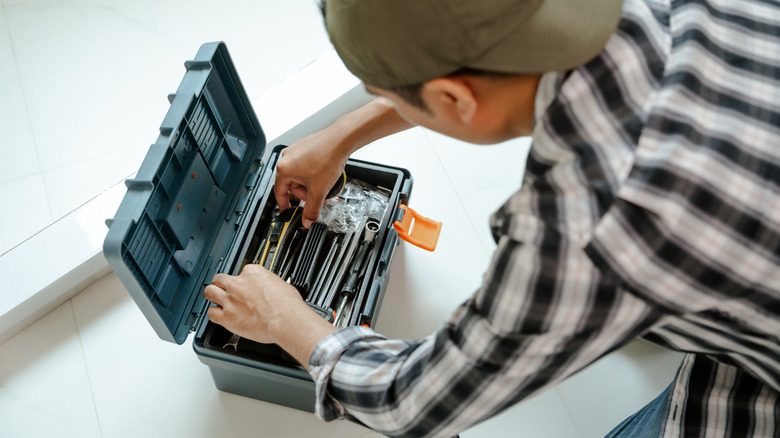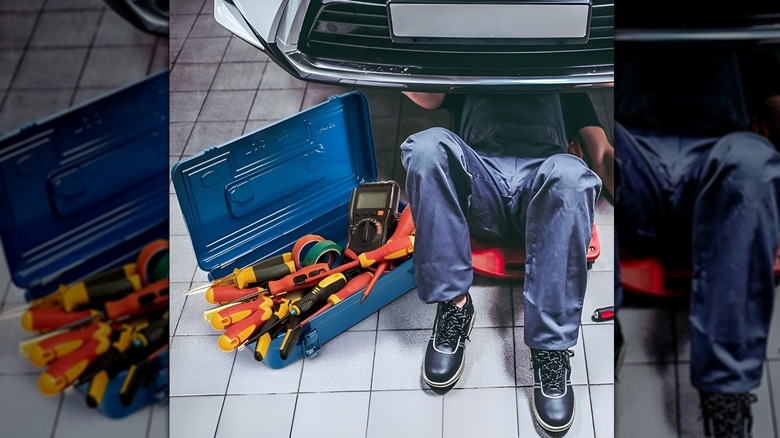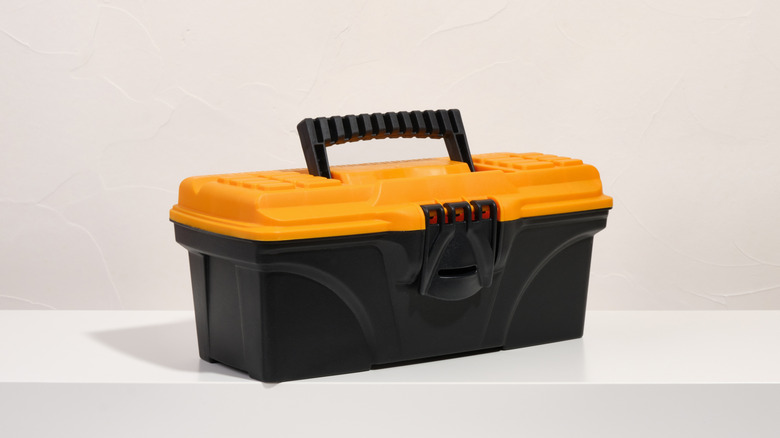Metal Or Plastic: Which Material Is Better For Your Tool Box?
We may receive a commission on purchases made from links.
It's hard to imagine life without tool boxes. Sure, you could theoretically shove all your tools into a backpack, storage bin, or luggage if you really wanted to, but few, if any, of these items provide as effective a blend of convenience, portability, and organization as your average tool box does by default. Much like the gizmos and gadgets it carries, a tool box should be viewed as a long-term and reliable investment that fits your needs and preferences. While you may have already weighed out which is the best brand, you may not have taken the time to consider the material your tool box is made of in the grand scheme of things.
While you can find tool boxes made out of unique materials, such as wood, the most common varieties you'll see lugged around are made of either metal or plastic. It's easy to see why, as both materials are easy to manufacture, are readily available in most hardware stores, affordable for most consumers, and are sturdy and easy to maintain. But despite these similarities, there are plenty of nuanced differences between these tool box types that can make a world of difference in the long run. There's truly no definitive answer as to which is better or worse; rather, one will work better for some than others.
When to go with metal
For DIYers looking for something built tough, it's hard to go wrong with a metal tool box. Whether made out of aluminum or stainless steel, metallic tool boxes are designed with strength in mind, making them a great option for someone seeking a long-lasting solution. But even these benefits don't make metal toolboxes ideal for everyone.
The defining aspect of a metal toolbox is its durability. Whether they're bumped, knocked, dropped, or kicked, these tool boxes can take a substantial amount of workplace abuse without showing signs of weakening or damage. Those made out of aluminum come with the added benefit of being weather and rust-resistant, making them ideal for outdoor work situations where your tool box will encounter moisture and debris. Along with being better at supporting heavier tools, metal boxes also come with additional features for greater personalization, such as special locks, trays, and durable compartments.
As you can imagine, these perks don't come cheap. Metal tool boxes are typically going to cost you more than other types. For example, a 16-inch Husky Tool Box sold at Home Depot currently goes for just under $13, while an 11-inch metal Urrea model costs nearly $26 from the same retailer. Additionally, certain metals, such as steel, require upkeep to avoid rusting and ensure their longevity. Nevertheless, for those with higher-level professional needs, a metal tool box makes for a wise investment.
When to go with plastic
Plastic tool boxes are among the most commonly seen and widely available options you'll find. While they're easy to underestimate when put up against their stronger metal counterparts, that doesn't mean they aren't worthwhile as a whole. In fact, plastic tool boxes can provide plenty of longevity and value, so long as they are used by the right person.
While metal tool boxes may be the longer-lasting investment, plastic ones offer greater value in many cases, as you can find longer, more spacious models for far less from top-tier brands such as DeWalt and Stanley. This makes them ideal for the budget-conscious individual. That's not to say that plastic tool boxes are weak. Being composed of harder plastics such as polypropylene and polystyrene gives these tool boxes a solid amount of durability, including being rust-resistant and requiring less maintenance as a result. Additionally, their lightweight design makes them easier to carry for longer periods.
While plastic tool boxes can provide a good amount of support and take their fair share of hits, especially for hobbyists, homeowners, and even garage mechanics, they aren't without their limits. They are more prone to chips, cracks, and dents than metal tool boxes, which can make it difficult to carry a lot of tools or take them to heavy-duty workspaces. As a result, it's especially important to examine your needs before deciding if a plastic tool box is right for you.


